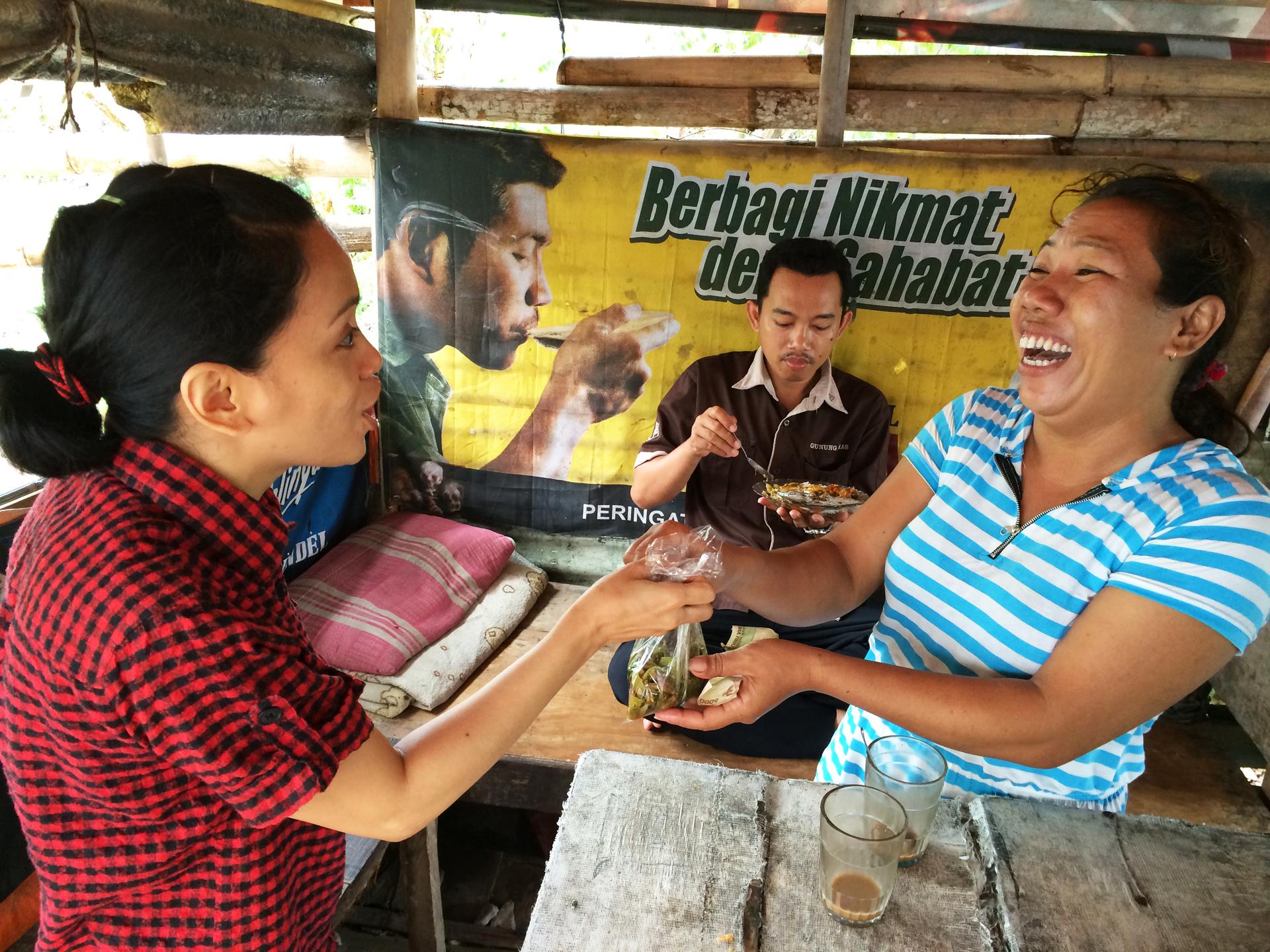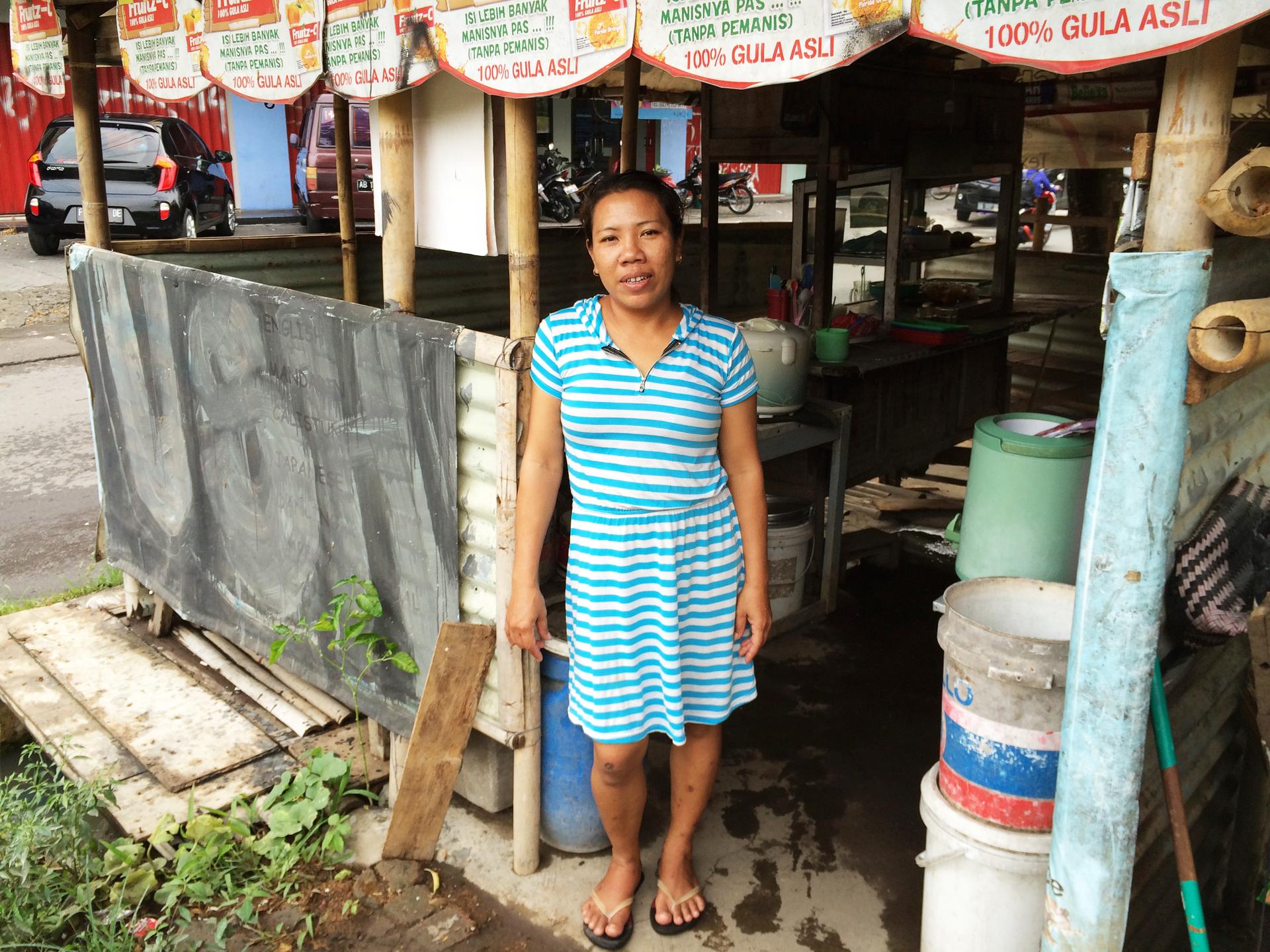The food shop is tiny, but it represents something big for her: freedom
Yanti runs a small food shop in Yogyakarta, Indonesia. She's a survivor of domestic violence in a country where women are increasingly reporting cases.
It’s lunchtime in the town of Yogyakarta. At a small roadside food shack, or warung, above a drainage ditch, a woman busily scoops rice onto plates and pours juice.
Many of her customers come here daily for the Javanese delicacies she makes from scratch: homemade noodles, salted fish, chicken soup, vegetables, bitter fruit, eggs, cut papaya leaves and more. Her name is Sugiyanti (she goes by one name), but everyone calls her Yanti.
She’s turned this once-quiet spot into a popular, lively hangout for locals, and become an entrepreneur.
But just a few months ago, Yanti left a 21-year marriage with a violent man.
“He verbally and physically abused me,” says Yanti, 42. “He would kick me and slap me,” she says, pointing to her head, face and arms. “He would throw things at me: keychains, a rice cooker.” One time he threw a plastic cabinet at her.
She says that when she found out about his affairs with other women, he became even more violent. The marriage finally ended in divorce.
In Indonesia, reported cases of domestic violence have dramatically increased over the past few years, with figures more than doubling from 2010 to 2014. That’s partly because women are speaking up more to report violence, according to the country’s National Commission on Violence Against Women.
After Indonesia passed its first law criminalizing domestic violence in 2004, women began to come forward in greater numbers. Before 2004, there were no legal punishments for physical, psychological or sexual violence. Now, under the law, perpetrators can face imprisonment or fines.
“That’s when the country first started to see domestic violence as a crime,” says Aditya Putra Kurniawan, a counselor at Rifka Annisa Women’s Crisis Center in Yogyakarta. His organization uses radio, television and social media to explain domestic violence and how it’s punishable by law. In some rural areas, this is a new concept. Still, he says, many women do not report this kind of violence or abuse. “They see it as a family issue,” Kurniawan says.
Additionally, the statistics only reflect cases reported in certain parts of the country, so the data is far from complete. For this reason, says Risya Ariyani Kori, who heads the United Nations Population Fund’s gender team in Indonesia, “the limited data available does not portray the true magnitude of the problem.”
But change is happening. In September, Indonesia’s government will conduct the first nationwide survey on violence against women. This will help them map the problem and determine the necessary scope of the response.
And in some places like Yogyakarta, a bustling university town in central Java, gradually changing attitudes about violence against women have meant that some women, like Yanti, are beginning to forge their own path. One of the major barriers to exiting abusive relationships for women all over the world is economic dependence on men.
Nonprofit groups in Indonesia, including Rifka Annisa, which means “woman’s friend,” connect domestic violence survivors to services that assist women with loans and other financial matters. They also teach them entrepreneurship skills and how to run a small business.
“Empowering women financially gives them confidence to make their own decisions,” Kurniawan says.

“It’s been my dream … to have my own food shop”
Today, not even a torrential downpour stops customers from flocking to Yanti’s shop, which resembles a food truck with a long bench inside. While she sits down for an interview, her customers help themselves, filling up plates of food cafeteria-style. They eat on the bench, talking amongst themselves and politely waiting to pay.
Yanti opened this shop about five years ago with her husband. But when her marriage ended, she began to operate it independently. Rifka Annisa counseled her how to make decisions and encouraged her to apply for financial support to run the shop.
Yanti says the hardships of her childhood prepared her for a difficult life. At age 12, she dropped out of school because her family could no longer afford it. “I felt sorry that I didn’t continue my education, but my family’s situation made it impossible,” she said.
She had started doing side jobs — cleaning houses and washing clothes with her mother — to help her family earn a living. At 14, she started working at a burger shop and shared her meager earnings with her mother. “It’s been my dream ever since I was working in the food industry to have my own food shop,” she says.
Years later, she runs her own place, but can’t afford to hire any helpers. Her earnings support her two children, who live with their father. “They were told if they stay with their father, they will have a permanent house, so they chose their father,” says Yanti. She’s emotionally torn, because she’s terribly close to her children, but wants them to live in a real home. She lives alone in a rented boardinghouse room half the size of her cramped shop.
Though few women in her socially conservative community talk openly about domestic violence, let alone divorce, Yanti doesn't hide her situation from her customers.
One regular, Claudia Dewi, walks in from her job at the Kumon tutoring center across the street. She and Yanti joke and exchange stories as Yanti fills a bag of vegetables for her to take to go. “She’s strong and independent, and can arrange her own matters,” Dewi says. “She doesn’t depend on her husband or any man. No one can tell her what to do.”
An air-conditioning repairman named Sugino sits down for a late lunch. He’s been coming here for two years. “It’s great she has this business, because nobody supports her,” he says. “Ideally, women should stay at home taking care of children in their house, but that’s not the case for everyone.”
That’s a somewhat progressive view in a country where long-held attitudes toward women are difficult to change, according to Rifka Annisa’s research. Kuriawan is one of the NGO’s counselors who has long worked with men. “The community is still traditionally masculine, so we can only change their skills, not their perspective,” he says.
As the soft-spoken repairman finishes his meal, he compliments Yanti’s food. “I really like the salted fish,” he says. “And even though I have a wife who cooks, I’m still taking it home.”
Yanti takes great pride in her work, and values the connections she’s formed with her customers. “What I do is very useful, greeting customers, asking them about their lives,” she says.
But, most of all, she does this for her children’s sake. “It’s exhausting work, but every time I’m tired, I remember my children,” she says, crying as she thinks about them and their future. She prays they will not have a tough upbringing like their mother and works to earn money for their education. “I’m helping them find a better future,” she says. “So, Inshallah, my efforts will be blessed."
This story was originally published by YES! Magazine, a nonprofit publication that supports people’s active engagement in solving today’s social, political and environmental challenges. Sonia Narang reported from Indonesia with support from the UN Foundation.
